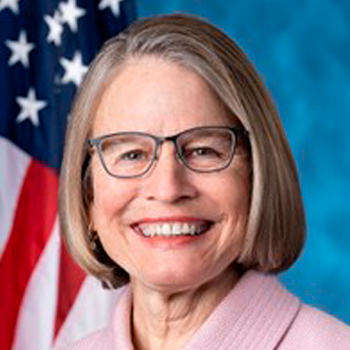November-December 2023 spotlight
Mariannette Miller-Meeks, MD
Currently serves as a U.S. representative since 2021. She represents lowa's First Congressional District.
- Operated a private ophthalmology practice in Ottumwa, Iowa, until 2008.
- Served as the first female president of the Iowa Medical Society.
- Served as Iowa state senator for the 41st district from 2019 to 2021.
Specialty: Ophthalmology
Q: How did you become interested in serving in the U.S. House of Representatives?
A: I did not follow a traditional pathway into politics. I left home when I was 16 and enlisted in the Army at 18. I served for 24 years and retired as a lieutenant colonel. I opened an ophthalmology practice in Ottumwa, Iowa, and over the years, I’ve served as an assistant professor at the University of Michigan and the University of Iowa. I was the first female president of the Iowa Medical Society and the first woman on the faculty of the University of Iowa’s department of ophthalmology and visual sciences. I’ve also served as an Iowa state senator and the director of the Iowa Department of Public Health among other roles.
My interest in serving in Congress stemmed from my experiences in the military and in the medical field. Specifically, I first decided to run for office when I witnessed, first-hand, the failures of the Affordable Care Act. Patients couldn’t pay their premiums or control their care. As a physician, I know that financial burdens and stressors not only impact a person’s livelihood, but also change a person’s overall mental and physical well-being. So, I had to stand up and speak out against what I viewed as a deliberate injustice to patients, and I thought the best way to go about making a meaningful change was running for office.
Q: As a physician leader, why is physician advocacy important to you? How can physicians have a significant impact outside the practice of medicine?
A: In medical school, students are taught to do no harm. That principle, of doing no harm and therefore doing in-depth research to properly inform our care and decisions, has impacted me throughout my career—whether I was visiting patients during house calls in rural Iowa or drafting legislation on Capitol Hill.
Q: What are three lessons you have learned through the recent pandemic?
A: During the pandemic, I traveled across my district and administrated vaccines to Iowans. I witnessed constituents gain a new sense of freedom and “return to normal.” As a society, we all witnessed the miracles of modern medicine and the massive overreach by government officials at the same time. But through everything, we learned to have hope and stand up for our individual freedoms.
Q: Describe the top legislative issues that you are currently working on for seniors?
A: In today’s economy, where we are battling debilitating inflation rates and skyrocketing prescription prices, our seniors are often looking for financial relief without sacrificing the quality of their medications. That is why I was proud to introduce the Share the Savings with Seniors Act, a bill that lowers out-of-pocket costs for our seniors with chronic medical conditions and dispenses rebates to seniors. The legislation also ensures that seniors directly benefit from the savings that plans and pharmacy benefit managers (PBMs) negotiate on their behalf. The legislation is the House companion to the Senate’s the Share the Savings with Seniors Act.
I’ve also worked to prioritize patients and provide stability for physicians across the board by introducing the Strengthening Medicare for Patients and Providers Act. This bill helps independent physicians stay in practice by providing fair and consistent reimbursement under Medicare Part D and ensures patients have access to quality care from independent physicians. This will not only reduce long-term costs to the Medicare system, but will guarantee access for all Americans, especially those in rural areas.
Contact us
Have information about SPS members doing great work? Email us at [email protected].




